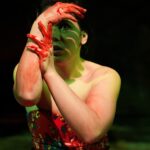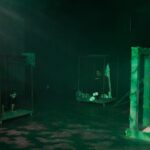October 26th | 17:00 – Excelsior Theatre, Ion Lucian Hall

A performance about a fictional world where Romani people colonise Western Europe, thus reversing the power dynamic and exploring the legacy of colonialism and oppression through a rewriting of The Tempest by Shakespeare.
[same_day_events_link]
Written by: Mihaela Drăgan, after William Shakespeare
Translated in Romani by: Izabela Tiberiade
Cast:
Ariel: Iulia Colan
Prospero: Zita Moldovan
Miranda: Anastasia Dade
Caliban: Nicoleta Ghiță
Directed by: Mihaela Drăgan
Stage design: Lia Dogaru
Costumes: Adelina Galiceanu și Zita Moldovan
Music: Andrei Horjea
Choreography: Răzvan Rotaru
Light design: Dodu Ispas
Sound: Daniel Feneșan, George Udrea
Co-producers: Giuvlipen and ”Marin Sorescu” National Theatre Craiova
Duration: 1h 30 min
Recommended age: 14+
Performance in Romanian and Romani
Special effects: strobe lights
Warning! The performance contains scenes with an emotional impact, hints towards rape and violence, blood.
Educational NTF
Caliban and the Witch is a rewriting of Shakespeare’s The Tempest, a title inspired by Silvia Federici’s book of the same name and the revolutionary texts and speeches of Frantz Fanon, Angela Davis, Malcolm X, and Ghassan Kanafani. Set in a fictional reality where the power dynamic between white Europeans and people of color are reversed, the performance challenges the audience to confront the deeply rooted legacy of colonialism, slavery, and systemic oppression. In this reimagined world, the Romani people, who historically have never had their own nation, come to power and colonise Western Europe. Prospero, a Christian Romani governor, creates an empire built on the subjugation of white Europeans. Prospero’s mission to spread Christianity and civilise the “barbarian” Europeans reflects the historical justifications used by colonial powers to rationalise the enslavement and exploitation of indigenous peoples.
The witch Sycorax, a character who lacks a voice in Shakespeare’s play, is given “justice” and becomes a key figure through whom we are shown how colonialism and patriarchal structures used witch hunts as tools of control and oppression. At the heart of the action is the character of Caliban, a European slave who represents the oppressed masses struggling against Prospero’s tyranny.
Photo: Orlando Edward









